- Home
- Lissa Evans
Crooked Heart
Crooked Heart Read online
Dedication
To Kate Anthony and Gaby Chiappe
Contents
Dedication
Prologue
Part One
Chapter 1
Chapter 2
Chapter 3
Chapter 4
Chapter 5
Chapter 6
Chapter 7
Chapter 8
Chapter 9
Chapter 10
Chapter 11
Part Two
Chapter 12
Chapter 13
Chapter 14
Chapter 15
Chapter 16
Chapter 17
Chapter 18
Part Three
Chapter 19
Chapter 20
Chapter 21
Chapter 22
Acknowledgements
About the Author
Credits
Copyright
About the Publisher
PROLOGUE
She was losing words. At first it was quite funny. ‘The box of things,’ Mattie would say, waving her mauve-veined hands vaguely around the kitchen.
‘The box of things for making flames. It’s a song, Noel!
‘The box of things for making flames
I can’t recall their bloody names.’
Or ‘that church’, she’d say, standing at the top of Hampstead Heath, gazing down at the scribble of blue and grey that was London. ‘The one with the dome – remind me of what it’s called.’
‘St Paul’s Cathedral.’
‘Of course it is. The architect has a bird’s name. Owl . . . Ostrich . . .’
‘Wren.’
‘Right again, young Noel, though I can’t help thinking “Sir Christopher Ostrich” has a tremendous ring to it . . .’
After a while, it stopped being funny. ‘Where’s my . . . my . . .’ His godmother would teeter around the drawing room, slippered feet not quite keeping up with her heavy body. ‘Where’s that damn thing, the blue thing, goes round my shoulders, the blue thing . . .’
Some words would resurface after a few days; others would sink for ever. Noel started writing labels: ‘SHAWL’, ‘WIRELESS’, ‘GAS MASK’, ‘CUTLERY DRAWER’.
‘Helpful little man,’ Mattie said, bending to kiss his forehead. ‘Be sure to take them down before Geoffrey comes to check on me,’ she added, suddenly shrewd again.
Uncle Geoffrey and Auntie Margery lived a mile away, in Kentish Town. Once a month, Uncle Geoffrey came for Sunday tea, and once a year he dropped by for Mattie’s birthday, always bringing a gift that had been made either by himself or by Auntie Margery.
‘There are times,’ said Mattie, examining yet another cross-stitched antimacassar, ‘when it’s very useful to have an open fire. What is the one thing that is more important than money, Noel?’
‘Taste.’
‘Which is something that Geoffrey and . . .’ she paused, ‘. . . bosoms . . .’
‘Margery.’
‘. . . will never have.’
At the monthly teas, Uncle Geoffrey smiled all the time and talked about his job in rate-collection, the marquetry picture frames he made in his spare time, and Auntie Margery’s delicate health, which prevented her from ever leaving the house. His teeth were regular and well-spaced, like battlements. Noel liked to imagine tiny soldiers popping up between them, firing arrows across the room or pouring molten lead down Uncle Geoffrey’s chin.
‘And what have you been up to, young Noel?’ his uncle would ask. ‘Keeping busy with hobbies? Model aircraft? Stamp collecting?’
‘Hobbies are for people who don’t read books,’ said Noel; it was one of Mattie’s sayings.
After tea, Uncle Geoffrey would ask whether there was anything he could do around the house, and Mattie always found something awkward or messy – shifting furniture, oiling a door. When the blackout regulations were published, Uncle Geoffrey was set to work sticking brown paper on the door-panes and checking every shutter for soundness.
‘After all,’ as Mattie said, ‘you are our war expert.’ He had enrolled as an air-raid warden the day after Mr Chamberlain came back from Munich. He had a hat, a whistle and an armband.
‘So all you need now is an air-raid!’ said Mattie.
She didn’t believe that there would be a war.
Mattie’s house was a spacious brick box, with a fancy ironwork verandah and a garden full of azaleas. ‘A Victorian gentleman’s residence,’ she said. ‘Or, more likely, the place where a Victorian gentleman secreted his mistress. Family in Mayfair, lady friend in Hampstead. It would have been considered frightfully out of town.’
The road ran along a little crease in the fabric of the Heath, coming to a dead end at a bolt of rabbit-cropped turf; from the rear windows of the house you could see only trees.
‘Who would know we were in London?’ said Mattie, nearly every day.
It was a hot, slow summer. In the early morning, when it was still cool, they walked the mile to Parliament Hill and back, leaving dark tracks through the wet grass, singing songs of protest to the skylarks:
As we come marching, marching,
We bring the greater days.
The rising of the women
Means the rising of the race.
No more the drudge and idler,
ten that toil while one reposes,
But a sharing of life’s glories:
Bread and Roses!
Bread and Roses!
Our lives shall not be sweated
From birth until life closes;
Hearts starve as well as bodies;
Give us bread, but give us roses!
On the final chorus repeats, Mattie would simultaneously hum and whistle. ‘A rare and underrated skill,’ she’d remark, ‘and one that, sadly, has never brought me the acclaim it deserves.’
During the afternoon heat, she slept in a deckchair and Noel lay on the lawn and read detective stories, noting down clues as he went along. Wood pigeons crooned in the trees.
‘Who’d know,’ sighed Mattie, ‘who’d know we were in . . . in . . .’
In the silence that followed, Noel rolled over and looked at her. Her square, sure face was suddenly unfamiliar; her expression one he’d never seen before. It was panic, he realized. Somewhere inside herself she was teetering on a ledge.
‘London,’ he said, ‘it’s London.’
‘Ah yes, London,’ she repeated, inching back.
The mechanical digger arrived one day when they were at the library. By the time they came home, the first lorry was already roaring back past their house, leaving a frill of sand along the verges behind it.
‘What are you doing?’ called Mattie to the driver, but he ignored her.
They followed the gritty trail to the end of the road, and there stood the great red digger. It had already scalped the grass from fifty yards of heath, and was taking savage bites out of the sandy slope. Another lorry was waiting for a load.
‘No!’ shouted Mattie.
Three neighbours arrived, sweating and gesticulating, and then a fourth, grim with knowledge.
‘It’s official,’ he said. ‘I’ve been talking to the council. It’s for sandbags, they say they’re going to need thousands if bombing starts. They’re grubbing up Hyde Park, too . . .’
Within the week, there were four diggers, not one, and a constant stream of lorries rattling up past the house and then grinding down again. The hole in the Heath grew daily, the cut edge a palette of yellows: ochre, mustard, butter, gold. When the wind blew, Mattie’s front garden was more beach than grass. Every floor in the house crunched underfoot. Mrs Harley, the char, said the extra work was too much for her, and left.
A man came to the door, offering filled sandbags at £5 for a hun
dred, or empty ones for 3d each. ‘And then you can do them yourself,’ he said. ‘Lucky for you, you’re right on the spot.’ Mattie closed the door in his face.
Their morning walk was changing. The detour they took to avoid the hole at the end of the road added another mile to the round trip; it was just too far for Noel, with his gammy leg, to manage comfortably, and meant he was always limping by the time they arrived home. There was a gun emplacement behind Parliament Hill now, and shelters being dug along the fields by the railway line. Mattie would stand and stare at the horizon, at the silver blimps motionless on invisible wires, and shake her head in disbelief. ‘Isn’t it strange,’ she said, ‘that there’s always enough money in the coffers for war?’
During his August teatime visit, Uncle Geoffrey talked about the international situation before patting Noel on the head. ‘And I wonder where this young shaver will be off to?’ he said, smiling as usual.
‘What d’you mean, “off to”?’ asked Mattie, very sharply.
The smile wavered. ‘You’ll have registered him, I suppose, for evacuation?’
‘No, why would I have done that?’
Geoffrey looked flustered. ‘I didn’t mean to annoy you, Mattie dear,’ he said, advancing a hand as if to pat one of Mattie’s, and then wisely withdrawing it again. ‘It’s just that the government . . .’ With an effort, he hoisted the smile back on to his face, where it hung a little crookedly, ‘. . . the government considers that the best place for children, in the event of a war, is away from the areas of likely bombardment.’
‘There is no war.’
‘Not yet, perhaps, but I think the likelihood is—’
‘And since when have I ever taken any notice of what the government says?’ asked Mattie.
There was no possible reply to this. She had been gaoled five times as a suffragette; she still had the scars of handcuffs on her wrists.
‘Do you want to be evacuated?’ Mattie asked Noel, afterwards.
‘No,’ he said.
‘I’m sure Roberta would have you to stay in . . . where is it that Roberta lives? Ipswich? I’m sure you’d be safe there.’
‘I don’t want to go anywhere,’ he said. He was a little bit worried by the thought of bombs. He was far, far more worried by the fact that Mattie seemed to have forgotten that her best friend Roberta was dead. The funeral had been eighteen months ago. Mattie had worn her old sash, and a white, green and purple rosette.
Poland was being invaded and the summer holidays were almost over. On the Saturday before the start of the Michaelmas term, Noel went to the library. He had read every Lord Peter Wimsey on the shelves, and every Albert Campion. The tall librarian with the moustache suggested he tried a thriller instead of a detective story. ‘You’ll find Eric Ambler very good,’ she said. Noel was brooding over the choice of titles when he received a blow between the shoulder blades.
‘Hello, Lugs,’ said Peter Wills, loudly.
Noel nodded at him, in a polite but dismissive way. Peter was in the form below him at St Cyprian’s Prep – only-just-nine to Noel’s nearly-ten – but Peter tended towards condescension because his father was in the army reserve. And because he had a father.
‘Ready for the off?’ asked Peter. ‘My mother bumped into Cleggo and he says we’ll be heading for Wales, worst luck. But it’s near the sea, he says.’
‘I’ve decided not to go,’ said Noel. ‘I’m staying in London.’
‘Crikey.’ Peter looked envious. ‘You’ll get to see all the fun then.’
‘You can imagine what a bitter blow it is to me—’ the Prime Minister was saying, as Mattie swatted the ‘off ’ switch. ‘Bugger,’ she said. ‘Bugger and bugger. Bloody men. Everything has to be solved by firing guns at each other. Bang bang you’re . . . you’re . . .’ She paced around the dining room, pushing her hands through her hair so that it stood up in a wild crown. ‘How did it come to this?’ she demanded, looking at Noel.
Uncle Geoffrey, who never telephoned, rang to inform them that war had been declared, and to ask whether they needed help with the blackouts. ‘Thank you, but we can manage,’ said Mattie. It took them an hour, and the light was fading before they finished.
‘Don’t like a room without windows,’ said Mattie, who rarely closed the curtains in the evening. ‘Airless. Reminds me of those places. The ones with locks and so on.’
In the night, Noel woke suddenly. He lay in the stifling darkness, and listened to Mattie walking from room to room, flinging open the shutters.
The day after that, all the children disappeared, as if London had shrugged and the small people had fallen off the edge. Noel, running an errand, was stared at in the street. The baker asked why he hadn’t gone with the others. ‘I think you’ll find that evacuation is not compulsory,’ replied Noel, loftily. It was what Mattie had said to an interfering neighbour.
He took a walk up the hill to his school, and looked at the padlock and chain around the gates. ‘Closed until further notice’ read a sign. It hadn’t occurred to him that this would happen; he’d seen himself as the sole pupil, attending exclusive lessons. The council school on Fletcher Road was shut as well, the windows boarded up.
Noel sat on a wall for a while, before going home; Mattie hated the government but she was very keen on education.
For two weeks he left the house at eight, wearing his school uniform and carrying his satchel and gas mask. After calling at the library, he took the bus to the top of Hampstead Heath, and walked to the Climbing Tree. It was an oak that had been struck by lightning three years before, and lay full length across a clearing. It was usually infested with children, but now he had the great sprawled form to himself, and he sat in the crook of a branch and read all of Eric Ambler, and then all of Sherlock Holmes. Early in the third week, he looked up to see Mattie staring at him.
‘I was listening for woodpeckers,’ she said, ‘but instead I found a lesser-spotted truant.’
‘The school’s all locked up.’
‘Then we shall turn our house into a school.’
For three days, she gave him proper lessons (Great Women of History, the Causes of the French Revolution) and set him essays (‘Would You Rather Be Blind or Deaf?’, ‘What Is Freedom?’, ‘Should People Keep Pets?’, ‘“All Things Are Difficult Before They Are Easy”: Discuss Fuller’s Aphorism’), marking his work with red ink and rolling sentences: A splendid attempt. Your argument was presented with considerable éclat. On the fourth morning, there was a knock at the door. It was a short man in a boiler suit and a white helmet – the Chief Warden, he said, from the East Hampstead Branch of the ARP. There had been reports of breaches of blackout regulations.
‘Reports from whom?’ asked Mattie, booming out the last syllable, so that it sounded like a dinner gong.
‘Neighbours,’ said the warden. ‘Shutters open, shutters closed, lights on and off. They said it looked like signalling. Not that it was, I’m sure,’ he added, hastily, seeing Mattie’s expression, ‘but people are entitled to be a bit anxious at the moment, aren’t they, madam?’
‘Miss,’ corrected Mattie. ‘I am not a brothel-keeper.’
‘I have to warn you that the next step is a summons,’ said the warden.
‘D’you hear that?’ asked Mattie, turning to Noel. ‘This little man is threatening me with court.’
The warden flushed a dark red. ‘There’s no need for rudeness,’ he said. ‘I’m enforcing government rules. And while I’m here, I’d like to ask whether the following have been carried out. Taping of windows. Readiness of buckets containing sand and water. Insulation of a room to be used as refuge in the event of a gas attack.’
‘Are those, too, legally enforceable?’ asked Mattie.
The warden shook his head.
‘Then no,’ said Mattie. ‘Go away, little man, and interfere with someone else.’
‘You do realize,’ said the warden, his voice hardening, ‘that the courts take blackout infringement very seriously indeed. We’re no
t just talking about fines here; there could be a prison term.’
He left, crunching along the sandy path to the front gate. Mattie gave a little grunt and Noel looked up at her. Her face was puffy and skewed, as if the warden’s last sentence had been a blow with a boxing-glove. ‘Those places . . .’ she said, and gripped Noel’s hand. ‘Never,’ she said.
In the weeks that followed, Noel found himself thinking about Dr Long, who taught algebra and physics at St Cyprian’s, and who presented each new law or principle to the class as if he were lifting a jewel out of a casket. Dr Long expected interest and asked for wonder, unlike Mr Clegg, whose Geography lessons were like a series of punishments. Thirty strokes with the principal exports of the Malay Peninsula.
‘Imagine,’ Dr Long had said to Noel’s form last term, ‘imagine Archimedes’ lever. Imagine it stretching from star to star, one end nudging the base of our planet, the centre of it propped on a titanic fulcrum, and at the other end, standing on a cloud of galactic dust, a small man in a toga. He extends a hand, he places a finger on the end of the plank, he presses down . . . and our Earth goes bowling across the universe.’
One nudge and the world was changed. The warden’s visit had done it; it had flicked Mattie out of her orbit and now she was spinning off on a course of her own.
She drew up a list of neighbours who might have reported her to the warden. It started off with Mr Arnott, who lived in the next villa, but then she kept adding names until everyone was on it. ‘We shall no longer speak to them,’ she said to Noel. ‘In fact,’ she added, ‘I should prefer not to see them at all.’
Now, when they went out for their morning walk, Noel had to go to the front gate and check that the road was empty before Mattie would leave the house. Though they weren’t really ‘morning walks’ any more; Mattie wasn’t sleeping well, and woke late, so it was almost lunchtime before they were cresting Parliament Hill. The lessons were replaced by occasional questions: thirty-five multiplied by fifteen, the Roman invasion, the life-cycle of the honey bee. Once Mattie woke him at dawn, and asked him to name three British scientists. ‘Newton, Boyle, Darwin,’ he said, yawning, while a wren shouted in the ivy outside.

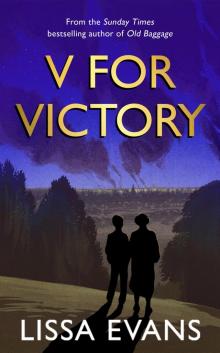 V for Victory
V for Victory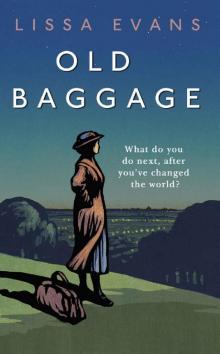 Old Baggage
Old Baggage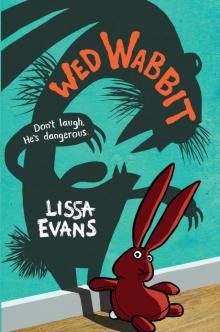 Wed Wabbit
Wed Wabbit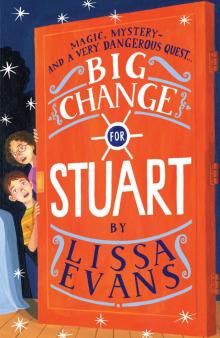 Big Change for Stuart
Big Change for Stuart Spencer's List
Spencer's List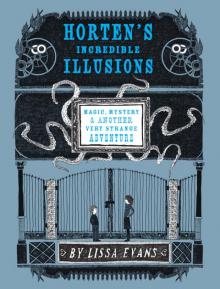 Horten's Incredible Illusions
Horten's Incredible Illusions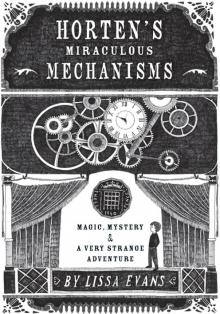 Horten's Miraculous Mechanisms
Horten's Miraculous Mechanisms Their Finest Hour and a Half
Their Finest Hour and a Half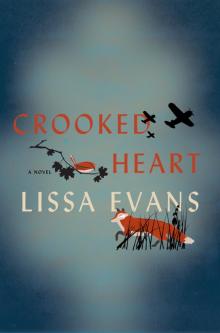 Crooked Heart
Crooked Heart